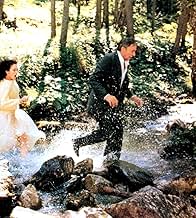'Tout feu tout flamme' (1982) is one of only eight films directed in his career by Jean-Paul Rappeneau, an interesting but not very prolific French film director. This is one of his least appreciated films today, although at the time of its release on screens it enjoyed good publicity and the presence in the cast of two formidable actors: Yves Montand whose career already had gathered three decades and Isabelle Adjani at her peak, shining and beautiful. In fact, the two actors support this film and if the movie is worth seeing today it's because of them. In their absence, we would have been left with a mediocre and not very funny movie.
The heroine of the film is Pauline Valance (Isabelle Adjani), a beautiful and brilliantly intelligent young woman, the expert assistant of the Minister of Finance. She spends her days in international conferences at the highest level, the evenings she returns home where she takes care of her two younger sisters, teenagers, and her grandmother, the owner of a Parisian building. Suddenly the father (Yves Montand) reappears in their life, many years after having left his family (his wife is apparently dead) to do dubious business with casinos in the Bahamas and Canada. We will soon find out that the exuberant and charming father returned not only because of the longing of the family, but also to seize the property, sell it and use it as a source of financing another dubious business with a casino, this time on on the shores of Lake Geneva, between France and Switzerland. How much is scam and how much is paternal feeling in the person and the actions of the character?
'Tout feu tout flamme' suffers from the syndrome of films that try to attract viewers of several film genres without deciding exactly where it belongs. It's often a recipe for failure, and that's exactly what happens here. The film begins as a family comedy, continues as a film about father-daughter relationships, to become in its second part an action comedy with a touch of political satire. It doesn't do very well in any of these categories. What makes the film interesting even almost 40 years after its release on screens is the charismatic presence of Yves Montand, who conquers not only the hearts of those around him on screen, but also those of the audience in the room, manages to convince both when he loves and acts melodrama, and as a bonus, he even sings. Besides him, Isabelle Adjani seems less convincing than usual, the comedy scenes in particular are thickened without much effect. Singer Alain Souchon also appears in a supporting role. He has an interesting physiognomy, but unfortunately his role was too thin. All those who miss Yves Montand, who is in this film at the age of maturity but in best physical and artistic form, must see this film. For the rest of the spectators, watching is optional.




























